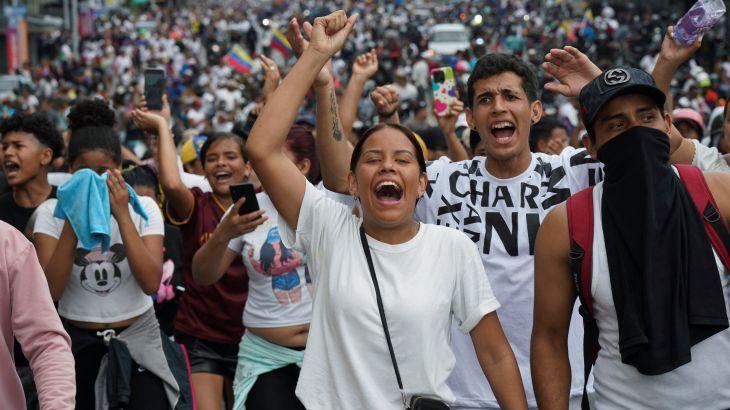Tensions escalate in Venezuela with the opposition releasing what it says is proof of fraud in the recent election, leading to protests and claims of election tampering. Get the latest updates on the situation in Venezuela.
Thousands of people have taken to the streets in Venezuela to protest against what they say is President Nicolas Maduro’s fraudulent election win. Maduro, who secured a third six-year term as president, denounced an attempt “to impose a coup d’etat” in the country.
“We have witnessed a series of events, more than 100 violent terrorist attacks,” Maduro said on Monday, blaming the opposition for these attacks.
In the capital, Caracas, officers used tear gas on Monday as crowds marched down the main road, banging pots and pans. In three cities, statues of Hugo Chavez, Maduro’s mentor and predecessor, were knocked down with sledgehammers.
So what’s happening in Venezuela, and what are the protests about? Here is what we know:
What’s happening in Venezuela?
On Monday, the National Electoral Council (CNE) certified Maduro’s re-election. The opposition has accused the electoral body of being loyal to the ruling United Socialist Party of Venezuela, which has been in power for 25 years.
The vote counting was riddled with claims of irregularities. The opposition said some of its witnesses were denied access to polling stations where votes were being counted and the electoral authority had prevented more votes from being processed.
The government and the CNE reported that Maduro won with 51 percent of the vote, followed by opposition candidate Edmundo Gonzalez with 44 percent. The government also accused the opposition of trying to rig the results.
Maduro said the opposition did everything “possible to have the elections suspended”.
“They burned electoral material. They burned the vehicles,” he added. Maduro also said the electoral process was the target of a failed “massive hack”.
The opposition coalition led by Maria Corina Machado disputed Maduro’s victory. On Monday, it said it obtained more than 73 percent of the tally sheets, showing more than 6 million votes for Gonzalez and 2.7 million for Maduro.
Machado said: “All the tallies were verified, digitalised and…
How do elections work, and what are the allegations of fraud?
In Venezuela, voters use electronic machines that record their votes and provide a paper receipt showing their chosen candidate. Voters are expected to deposit these receipts into ballot boxes before leaving the polling station.
After the polls close, each machine prints a tally sheet listing the candidates and their vote counts.
The ruling party has tight control over the voting system through the CNE and a network of local party coordinators.
Venezuela’s law states that opposition party representatives should be able to witness the voting process, vote counting and, most importantly, obtain a copy of the final tally sheet from the machines.
The opposition said some witnesses were blocked from following the counts and at other sites the tallies were not printed.
Later, Machado said Gonzalez’s victory was “overwhelming” based on voting tallies provided by campaign representatives.
Until late on Monday, the CNE had not released the tallies from each of the 30,000 polling stations across…
How did the protests erupt on Monday?
After the results were announced, Maduro supporters went out to celebrate his win in parts of Caracas, but hundreds of opposition supporters organised countermarches through the streets, waving Venezuelan flags and chanting “Liberty!”
According to local reports, the protests started on the balconies of houses, where people banged their pots and pans – a Latin American practice known as cacerolazo.
Later, they moved to the capital’s main roads, which were soon clogged by young protesters on motorcycles waving Venezuelan flags. Local reports said the protests also spread to other parts of the country like Zulia in the northeast and Carabobo in the northwest.
“People were in shock, and the belief that fraud had occurred quickly spread,” Carlos Pina, a Venezuelan political scientist, told Al Jazeera.
“Many accept this idea without question, leading people to take to the streets, particularly in neighbourhoods and towns with poorer communities,” he…
What are international actors saying?
Many regional and global governments have said they have serious concerns with the results, including the United States and the United Kingdom.
Latin American countries including Argentina, Chile, Costa Rica, Peru, Panama, the Dominican Republic and Uruguay refused to recognise the announced outcome. Venezuela expelled their diplomats from the country on Monday.
Venezuela also suspended commercial flights to and from Panama and the Dominican Republic.
Countries like China, Cuba, Iran and Russia were quick to congratulate Maduro.
The 35-member Organization of American States (OAS) called for an extraordinary meeting on Wednesday to “address the results of the electoral process”.
Meanwhile, US President Joe Biden and Brazilian President Luiz Inacio Lula da Silva are expected to speak on Tuesday, and the Venezuela results are expected to figure in their talks.
Brazil’s Ministry of Foreign Affairs said it was waiting for the CNE to publish data broken down by polling stations. It was, the ministry said, “an essential step towards transparency, credibility and legitimacy”.
Source: ALJAZEERA
ALJAZEERA MEDIA NETWORK
